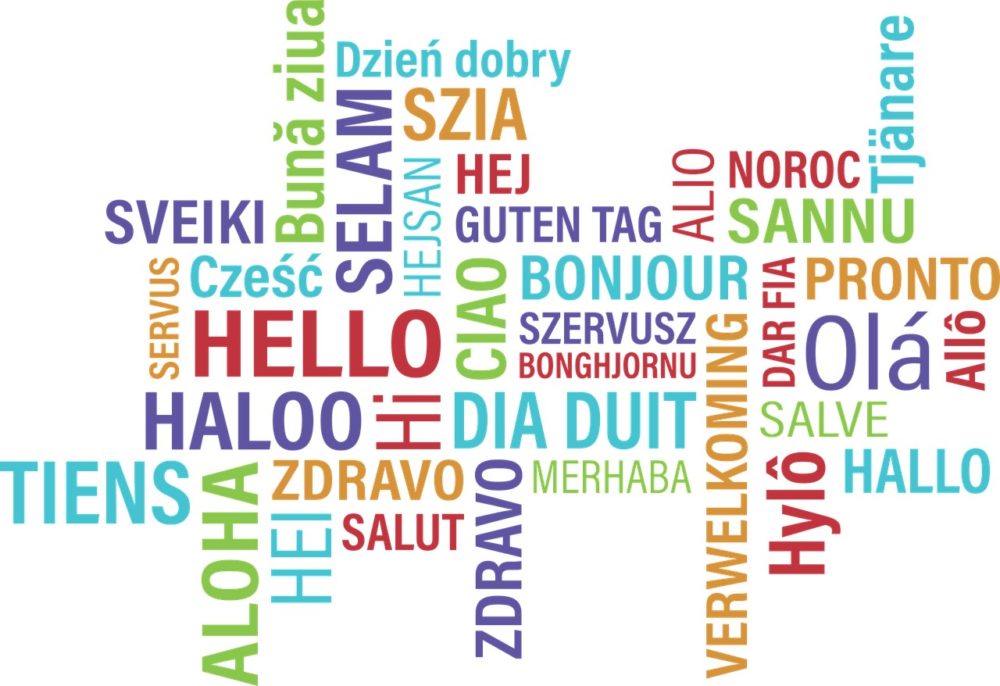
This is a guest post by Chi Fang. He is a language acquisition expert, entrepreneur and blogger. His company Verbalicity, helps people learn Spanish fast through 1-on-1 online tutoring.
Have you ever met someone who speaks 4 or 5 languages and wondered how they managed to learn so many?
For most people, the thought of learning even one new language can be extremely intimidating.
However, there are a few key strategies that you can employ to speed up the process exponentially while increasing your chances of success. Whether it’s your second language or your tenth, these universal principles can be used by anyone.
But before diving into these principles, we first need to clear the air.
Misconceptions About Language Learning
There are three main misconceptions that hold people back from learning a language. People will often say to themselves “I can’t learn a language because…”
1. You need to be naturally talented to learn a language
People often tell themselves that they’re “bad at languages” or that they “don’t have an ear for it”. Maybe they think this way because they’ve tried and failed in the past to learn a language. But whatever the reason, every beginner needs to rid themselves of this mentality before they start learning.
While it’s true that some people pick up languages faster than others, it has little to do with natural talent, good genes, or superpowers. In reality, learning a language quickly is all about being strategic, using the most efficient study methods and maintaining the right attitude.
You need to believe that you can do it, and don’t give yourself an excuse to throw in the towel if things don’t go your way.
2. You have to grow up with a language to master it
Despite what many people believe, adults are actually much more efficient when it comes to language learning than children.
Kids have to rely on raw input, accumulating tens of thousands of hours of exposure to the language through their parents or surroundings. Frankly, it would be foolish for an adult to try and learn the same way.

Instead, adults can use their experience and power of reasoning to learn grammar rules and vocabulary more quickly. They can take advantage of learning techniques and tools that children cannot.
So just because you didn’t learn a foreign language as a child, doesn’t mean that you’ve missed your opportunity. In fact, use your age to your advantage.
3. The best way to learn is to travel to a foreign country
For every person who’s lived in a foreign country for a few months and came back speaking a new language fluently, there’s someone who’s been there for 10 years and can barely order a beer.
Being immersed in the environment certainly gives you more opportunities to practice, but you still have to go out there and seize them.
With the advent of technology, you can now immerse yourself in a language without even leaving your house. You can find a language tutor online, or you can listen to podcasts and watch videos. Just because you can’t travel isn’t an excuse not to learn.
If you can rid yourself of these self-limiting beliefs, then you’ve already taken the first step towards successfully learning another language.
Next, we’ll outline some of the key principles to accelerate your language learning.
Hours vs. Months vs. Years
So how long does it really take to learn a language?
Many people believe that language learning is a lifetime commitment, that you have to struggle for years before you can become reasonably competent.
But that couldn’t be further from the truth.
There are many people who’ve learned a language in as little as 3 – 6 months, by practicing consistently every day with a high level of focus and intensity.
Consistency and intensity are paramount. People who say that they’ve been trying to learn Spanish for 2-years with little success, are probably lacking both of these ingredients.
They probably play with their free language app for 10 minutes a time. They probably took lessons for a few weeks, stopped for a month because they got “busy”, and then tried to pick it up again only to realize that they had forgotten everything.
All in all, they’ve probably invested about 100 hours of their time over a 2-year period.
Now imagine someone who spends 100 hours over 2 months learning a language.
They spend an hour every morning practicing conversations with their online tutor, and review grammar / vocabulary after dinner, before unwinding for the night.
Although both of these people invested the same amount of time, the results are exponentially better in the latter case.
In order to maximize your progress, you need to approach language learning with a sense of urgency. Forget about “years” altogether, and start thinking in terms of “hours” and “months”.
80/20 for Language Learners

Nowadays people use the 80/20 rule to achieve maximum results for minimum effort in nearly every aspect of life. For languages, the 80/20 ratio is even more extreme.
There are over 170,000 words in the English language, according to the Oxford English dictionary.
However, the most common 1,000 words make up 84% of all spoken dialogue. The next 1,000 words only add 6% in additional coverage (90% total).
So by learning just 0.5% of the English language (1,000 out of 170,000 words), you’ll be able to speak and understand it in the vast majority of situations that you’ll encounter.
Most languages (Spanish, French, German etc.) follow the same pattern. So by focusing on the small proportion of the language that carries the highest value, you’ll not only see results faster, but it also makes the entire endeavour of language learning appear less intimidating.
The same goes for grammar. Many people make the mistake of getting far too caught up in memorizing all the grammar rules of a foreign language, which can get very complicated.
For example, if you’re studying Finnish, each verb can be conjugated up to 200 different ways depending on the context (about 10 times as many ways as English). However, only a small fraction of these conjugations are actually used in everyday speech.
So your approach at the beginning should be to learn “well enough” to be functional in the language and then worry about the finer details later.
Hacking Vocabulary
Are you one of those people who forgets someone’s name 10 seconds after you’ve been introduced?
If so, then learning hundreds of new words in a foreign language can be a struggle. The good news is that there are two techniques that you can leverage to increase your memory drastically:
1. Visualization
People have difficulty memorizing a new word because it doesn’t have any meaning to them. The best way to remember a new word is to create a visual association in your mind.
For example, in Spanish, the word “clothes” = “ropa”.
Now try imagining someone’s laundry hanging from a line (or rope) and blowing in the wind. The imagery of clothes clipped to a rope, will form a strong bond that lets you recall the word more easily.

You can get pretty creative with these associations.
For example, the Spanish word for “to fit” = “caber”.
It sounds a lot like a combination of the English words “cab” and “bear”. So your visualization could be someone trying to fit a grizzly bear into a taxi. The image association doesn’t have to make any sense, it just has to work.
2. Spaced Repetition
An SRS (Spaced Repetition System) is a way of presenting information repeatedly at various intervals so that you won’t forget it.
Think of it as smart flash cards. You are presented with a card that contains a word in English. You need to recall that word in the language you’re trying to learn. If you can’t, then you’re shown the same card a few minutes later to reinforce your memory of that word. If you can recall it easily, the interval becomes longer (i.e. a few days later, or even weeks later).
The flash card (SRS) system is designed to jog your memory of a new word, just as you are about to forget it.
These days, there are many free SRS apps such as Anki. You can use them for short vocabulary review sessions as you go about your day.
Speaking: The Critical Path
If you know someone who is having a tough time learning a language, 9 times out of 10 it’s because they’re not speaking enough.
Beginners typically have the mentality that they should study a language first, and then start to speak when they feel ready. But it doesn’t work that way.
No matter how much time you spend studying that Spanish textbook, it’s not to going teach you how to speak Spanish.
You can listen to as many French podcasts as you’d like, but it won’t prepare you for a real conversation in French.
The only way to learn how to speak is by actually doing it.
Speaking forces you to think in real-time. You have to decipher what the other person is saying, formulate a response based on your grammar and vocabulary knowledge, and respond while trying to pronounce the words correctly.
Speaking is like an intense full body workout, and all of it happens in a matter of seconds.
So it’s no surprise that the most effective methods of learning are those that have a high amount of “talk time”, such as 1-on-1 lessons or language exchanges.
Unfortunately, you’ll probably never feel quite ready to speak in another language. People naturally want to avoid making mistakes and exposing themselves to potentially embarrassing situations.
But in order to succeed you have to fight past this feeling, get out there, and start talking.
Laser Focus: Eliminating What Doesn’t Work
There are countless ways to learn a language but all you need is one method that actually works.
Many language learners make the mistake of dabbling in too many different learning methods, trying to juggle between apps, audio courses, textbooks, and lessons. All of this is terrible for a person’s focus, and this “mile-wide, inch-deep” approach is not conducive to rapid results.
Instead, the right strategy is to evaluate which method is contributing most to your success, and double down on it. Everything else that is only making a marginal difference should be eliminated.

You should choose one primary method of learning to devote the majority of your time, as well as a secondary method that helps fill in the gaps.
In the example above, the tutoring sessions teach you grammar and allow you to practice your conversation skills while reviewing flash cards help expand your vocabulary. This one-two punch will help you progress much faster than trying to balance many different methods in an unfocused manner.
The Power of Relevance
Whether it’s traveling abroad to explore exotic destinations, or getting better in touch with a family member, everyone has an underlying reason for wanting to learn a new language.
However, traditional language learning methods tend to be very standardized. A typical language course takes the same approach for every student, regardless of their individual motivations.
So if you’re wanting to learn Spanish for travel but your language app is teaching you stuff like “El elefante bebe leche” (the elephant drinks milk), then that could be a problem.
Learning a language can be a long journey. In order to stay motivated, you have to be learning stuff that is relevant to you, so that you feel like you’re really improving.
Here are just a few ways to increase relevance:
- Create your own personal phrasebook
- Steer conversations towards subjects you’re interested in
- Ask your tutor to teach you material related to your interests
- Integrate language learning into your hobbies
- Watch your favorite shows / movies in your target language
Keeping things relevant ensures that what you’re learning will actually be useful to you. You’ll enjoy the process more because you’ll able to apply what you’ve learned to real life situations. This creates a positive feedback loop that motivates you to keep investing time into learning the language and yields faster results.
Wrapping It Up
Learning a new language isn’t as hard as you think. Nor is it something that takes several years to accomplish.
In English-speaking countries, being able to speak a foreign language is rather uncommon and may even be considered impressive. However in other cultures, being multilingual is completely normal. According to some estimates, more than half of the world’s population can speak two languages fluently, and nearly one in six people can speak three languages.
In other words, there are billions of people around the world that have successfully learned a second language. If you’re armed with the right strategies, efficient learning methods, and enough motivation, then there’s no reason why you can’t join them.
This is a guest post by Chi Fang. He is a language acquisition expert, entrepreneur and blogger. His company Verbalicity, helps people learn Spanish fast through 1-on-1 online tutoring.

What about learning Hebrew?